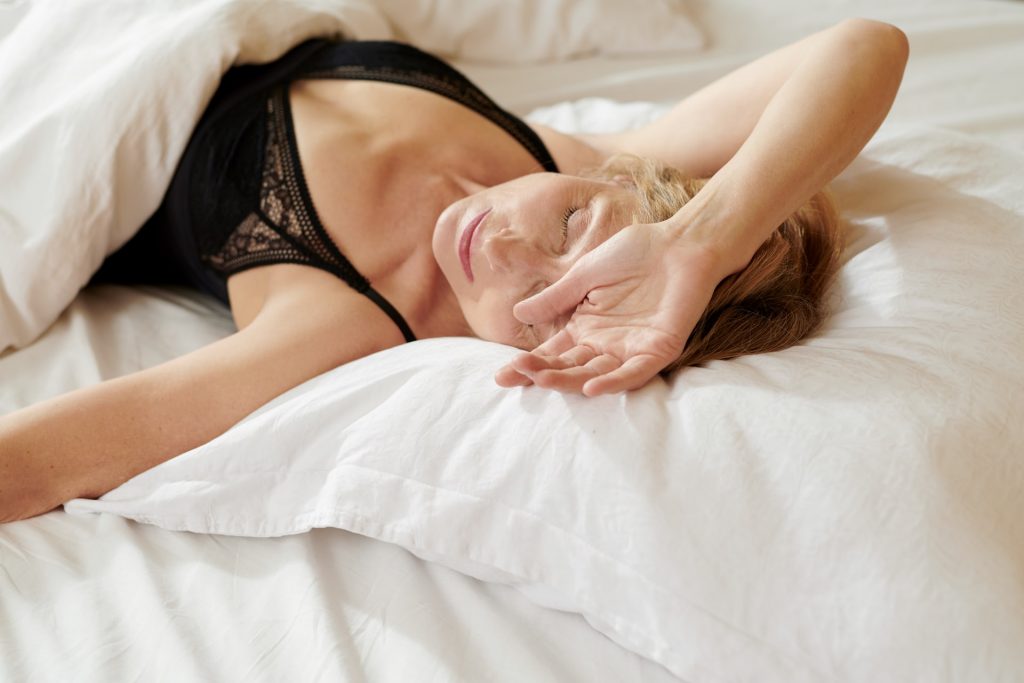Transitioning into a new phase of life such as menopause can be a stressful period for many women. Their body goes through a number of natural changes and symptoms due to the changes in the levels of hormones estrogen and progesterone, whose production in the ovaries gradually decreases as they age. Periods become irregular until they stop completely, causing the menstrual cycle to end and menopause to begin.
While there are women who are lucky enough to go through this period without experiencing any major discomforts that usually come with menopause, others go through a series of different menopausal symptoms, from fatigue and mood changes to insomnia and weight gain. In this article, we will be taking a look at some of the ways menopause affects your body and how you can deal with different menopausal symptoms.
Mood Swings And Irritability
A drop in hormone levels that occurs during menopause causes many women to experience frequent mood swings and irritability. Because of that, you might feel happy one moment and then feel down the next, or you can feel relaxed and then get angry and irritated. You may begin to feel as if you were constantly on an emotional roller coaster.
One way to deal with such shifts in mood is to perform exercises for stress relief. Try different relaxation techniques such as yoga or meditation and incorporate other breathing exercises as well. Also, try to get outside more often and spend more time in the daylight. Try a new hobby, do something you really enjoy, and remember to pamper yourself from time to time.
Elevated Cortisol Levels
Known as the ‘stress hormone’, cortisol is responsible for preparing our bodies for stressful situations. However, when it’s being continuously released, cortisol can actually cause your body to promote fat accumulation in the abdominal area. The fact that menopausal women also experience elevated cortisol levels at nighttime doesn’t help and it only further emphasizes the importance of effective stress and sleep management.
Aside from incorporating stress-relieving exercises into your daily routine, combating sleep problems is another way to control cortisol production in menopause and prevent abdominal fat accumulation. Ensuring a comfortable room temperature, having a bedtime routine, and avoiding caffeine and exercising before bedtime should help improve your sleep during the menopausal transition so you can get a full night’s rest.
Body Fat Distribution And Weight Gain
Menopausal women also go through certain metabolic changes. The drop in the levels of estrogen causes the body to function at a lower metabolic rate. This, in turn, causes the body to burn fewer calories overall, which often leads to menopause weight gain unless the daily calorie intake is reduced as well. A decline in reproductive hormone levels also changes the way body fat is distributed, so many women also experience the loss of waistline during this period.
Pairing a healthy diet with menopausal supplements can be an effective way to conquer weight gain during menopause. Regular exercise that combines cardiovascular exercises with strength training will also help combat menopausal weight fluctuations while also maintaining muscle mass and preventing fractures and osteoporosis.
Body Temperature And Hot Flashes
Another common menopausal symptom, hot flashes can be unpleasant, mostly because they are sudden. Combining heat surges and sweating with increased heart rate and flushed skin, hot flashes can last from a couple of seconds to several minutes, and after they pass, you experience a sudden chill.
While you may be unable to control hot flashes, you can try to regulate your body temperature. Layers of clothing that can be easily removed can help you ease the unpleasant hot flashes when they begin. To prevent hot flashes from disrupting your sleep, make sure you wear light pajamas and use layers of covers that can easily be removed. Eliminating hot beverages and caffeine can also be helpful in managing hot flashes, and so can practicing meditation and other mindfulness techniques.
Frequent Urination And Incontinence
Incontinence, or bladder leakage, is a common problem in menopausal women. It occurs as a result of hormonal changes, mainly the drop in estrogen levels. Menopausal women can also experience the urge to urinate more frequently, and bladder leakage can occur when they’re working out or simply sneezing or laughing.
To help prevent accidental urination, it’d be best to avoid caffeine and acidic foods as they cause the bladder lining to become irritated. Doing Kegel exercises is a practical way to improve pelvic floor muscle strength and it can help you manage incontinence more effectively.
For extra protection, while staying active, the booster pads secure underwear and clothing while being super comfortable to wear. Not to mention that they easily absorb any occasional leakage and a great solution to restore your confidence. You have a little less to think about, pick the right booster pads.
Lowered Sex Drive And Vaginal Dryness
As their estrogen levels decrease, many women who enter menopause may experience vaginal dryness due to a lack of elasticity and lubrication. This may cause them to experience pain during intercourse, and sometimes, they may also notice changes in their sexual drive.
The problem with vaginal dryness can be solved with a vaginal moisturizer or an over-the-counter, water-based lubricant. These may make sex more pleasurable for menopausal women as they decrease friction. When it comes to improving your libido, consider medical treatments, at-home remedies, or changing your sexual habits. You can also consult with healthcare practitioners for other causes of your pain. They will help in prescribing proper treatment for your condition. They may recommend using a medical device for pelvic pain, along with therapy, depending on the underlying cause of the painful sex.
Wrapping Up
Menopause is a major change in a woman’s life, one that comes with various symptoms. While these symptoms can be disruptive, there are ways you can manage them effectively so they don’t come in the way of your daily activities.








